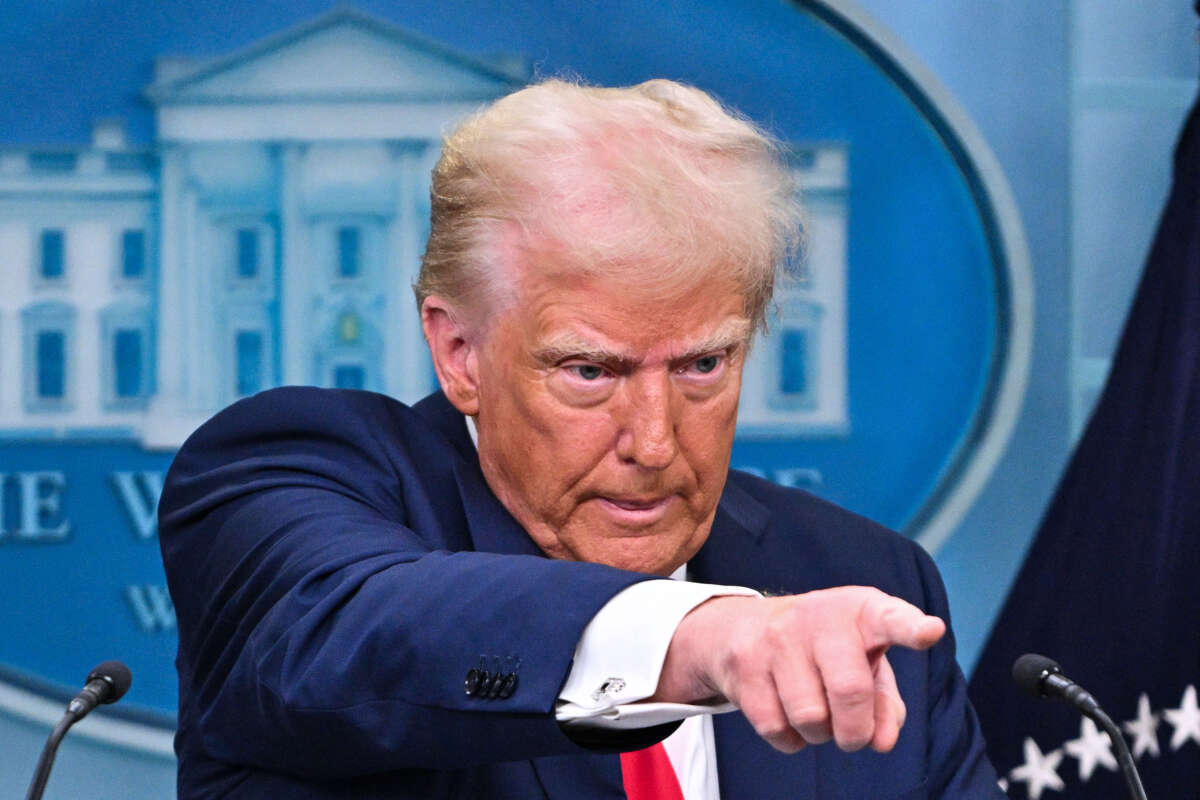Honest, paywall-free news is rare. Please support our boldly independent journalism with a donation of any size.
Shortly after he imposed massive tariffs against the United States’s top trading partners, President Donald Trump suggested that American consumers could feel “some pain” as a result of the new tariffs.
Trump signed three executive orders on Saturday that will raise tariffs on Canadian and Mexican goods by 25 percent. Imports on oil from those countries would be exempted to a 10 percent rate to stave off rising prices at the gas pump for U.S. residents — an admission by the administration, of sorts, that high tariffs will affect American consumers. Trump also issued an executive order imposing a 10 percent tariff on Chinese goods.
A White House fact sheet on the tariffs suggested that they were imposed to address issues of immigration and the transport of illegal drugs into the U.S. Neither that sheet nor the orders themselves indicated what actions were being requested of the three countries that would result in the tariffs being lifted.
The tariffs, which will begin officially on Tuesday, were imposed due to a “national emergency” on those issues, the White House claimed.
Trump was inconsistent in his comments to reporters, citing a multitude of reasons for issuing the tariffs — including the U.S. supposedly getting “ripped off” by its trading partners. Trump also acknowledged that the country’s economy would falter, at least a little, because of the trade wars.
Trump brushed aside concerns about the tariffs potentially raising consumer prices, although he admitted that Americans would probably be paying more.
“I’m not concerned. We may have short term, a little pain, and people understand that,” the president said.
These remarks contradict Trump’s promises on the campaign trail — that, when he imposed his planned tariffs, they wouldn’t affect consumers but rather would be paid for by the countries he targeted, a projection that several economists had warned would prove incorrect. Trump also promised that in spite of these massive tariffs, consumer prices would go down if he were elected president.
“Groceries, cars, everything,” Trump said last fall. “We’re going to get the prices down.”
In Truth Social posts over the weekend, Trump acknowledged that Americans may feel “pain” as a result of his tariffs, and described opponents of his plan as being part of a “globalist” conspiracy.
“THIS WILL BE THE GOLDEN AGE OF AMERICA! WILL THERE BE SOME PAIN? YES, MAYBE (AND MAYBE NOT!),” Trump wrote. “BUT WE WILL MAKE AMERICA GREAT AGAIN, AND IT WILL ALL BE WORTH THE PRICE THAT MUST BE PAID.”
In a separate post, Trump implied that people opposed to the tariffs were un-American — calling them “people or entities [that] are controlled by China, or other foreign or domestic companies.”
“Anybody that loves and believes in the United States of America is in favor of Tariffs,” Trump claimed.
In reality, recent polls show that a plurality of Americans have a negative view of Trump’s tariffs, which he has been discussing for several weeks now.
An Economist/YouGov poll published last Wednesday showed that, when asked about possible 25 percent tariffs on goods from Mexico and Canada, only about a third of Americans (35 percent) supported them, while one in two (48 percent) were opposed to the idea. A Quinnipiac University poll, also published last week, found that 48 percent of Americans believe that such tariffs will “hurt” the U.S. economy, while only 42 percent believe they will “help” it.
Both heads of state from Canada and Mexico announced that they would issue retaliatory tariffs against the U.S. because of the ones Trump was imposing on them.
Mexican President Claudia Sheinbaum hasn’t yet ordered that tariffs be issued, but said they would happen soon unless Trump agreed to lift his order.
“It is not by imposing tariffs that problems are solved, but by talking and dialogue, as we have done in recent weeks with your State Department to address the phenomenon of migration,” Scheinbaum wrote on the social media site X on Saturday night.
Canadian Prime Minister Justin Trudeau immediately ordered a 25 percent tariff on multiple U.S.-made goods, and promised more to come within 21 days, “to allow Canadian companies and supply chains to seek to find alternatives.” He also issued a direct statement to U.S. residents, telling them, “We don’t want to be here.”
“This is a choice that, yes, will harm Canadians, but beyond that, it will have real consequences for you, the American people,” Trudeau said, adding, “tariffs against Canada will put your jobs at risk, potentially shutting down American auto assembly plants and other manufacturing facilities.”
On Monday morning, Trump announced that he would pause tariffs against Mexico for a month after officials from that country announced they would send 10,000 troops to the U.S.-Mexico border. Negotiations with Canada on a potential pause or lifting of the tariffs were ongoing as of publication of this article.
Media that fights fascism
Truthout is funded almost entirely by readers — that’s why we can speak truth to power and cut against the mainstream narrative. But independent journalists at Truthout face mounting political repression under Trump.
We rely on your support to survive McCarthyist censorship. Please make a tax-deductible one-time or monthly donation.
